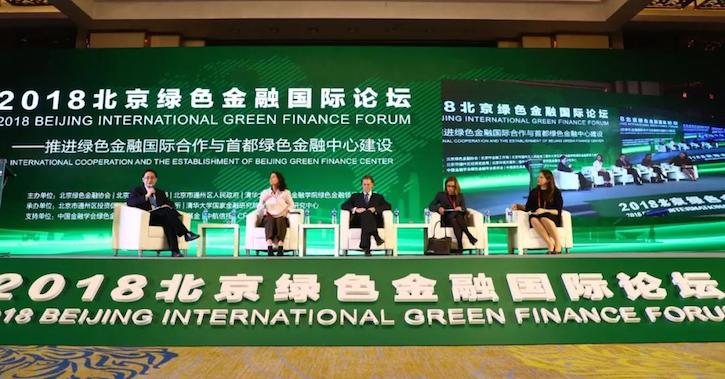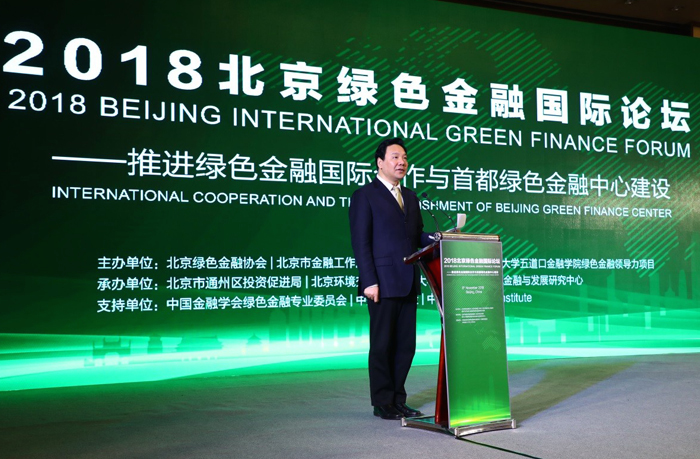
The Beijing Emissions Trading Association, Beijing Municipal Bureau of Financial Work, Beijing Tongzhou District People’s Government and Tsinghua Center for Finance and Development held the 2018 International Green Finance Forum in Beijing on November 8 with more than 400 representatives of nearly 100 institutions from more than 20 countries, including China, Britain, France, Argentina and Pakistan.
The forum’s theme was international cooperation in green finance and establishment of Beijing’s green finance capabilities. Like previous years, discussion of the latest research from the G20 Sustainable Finance Study Group and other global innovations of green finance were part of the program. But in a departure from past forums, the city of Beijing played an important role in organizing this year’s forum, which also shifted the goals this year which included exploring ways to make Beijing an international green finance center and how to showcase achievements of China’s green finance innovations. It has been reported that Tongzhou District, the urban subcenter of Beijing, will be chosen as a permanent site of the International Green Finance Forum.
The G20 Green Finance Study Group was jointly initiated by the People’s Bank of China and the Bank of England in 2016 when China chaired the G20. In 2018, the group changed its name to the Sustainable Finance Study Group, which put forward three initiatives on sustainable asset-backed securitization (ABS), development of sustainable equity investment (PE) and venture capital (VC) and application of digital technology in sustainable finance as included into the G20 Buenos Aires Communiqué.
Ma Jun, co-chair of the G20 Sustainable Finance Study Group and director of China’s Green Finance Committee, highlighted that the G20 Sustainable Finance Study Group’s three initiatives had already seen tangible results in China. Some examples are in green asset securitization, application of satellite remote sensing data in monitoring the enterprises environmental performance, and green technology incubation, with a joint Sino-UK project to be launched in Beijing called the Green Technology Industry Incubator. According to relevant sources, the 2019 G20 summit in Japan will not feature the Sustainable Finance Study Group as stand-alone working group and issues related to green finance will be discussed in the G20 Infrastructure Working Group.

At the forum, Yin Yong, vice mayor of Beijing and former vice governor of the People’s Bank of China (PBOC), emphasized that Beijing was well positioned to become a green finance center with its role in China’s green finance network becoming increasingly prominent.
In July this year, Beijing issued an important action plan for comprehensively deepening reforms and furthering opening up, which stated that Beijing would “strive to develop an international green finance innovation pilot zone, explore new instruments for developing green finance, and allow foreign investors to directly participate in green finance activities in the pilot zone.”
In terms of finance, Beijing sits on 45% of China’s financial assets. By the end of the first half of this year, Beijing’s green credit volume has exceeded 980 billion RMB, equivalent to about 15% of all credit granted in Beijing, which is higher than the national average of 9%. Beijing has also issued more green bonds than any other province in the country.
In addition, Beijing sets the policy benchmark on green finance. It serves as a model for other cities throughout China as central green finance initiatives are being to be emphasized and implemented. In 2017, Beijing issued the Implementation Measures for Building a Green Finance System in Beijing, offering greater policy support at the municipal level. On the same day, Beijing released a list of ten initial institutions to manage this effort.
Huo Xuewen, Party secretary and lead of the newly formed Beijing Municipal Financial Supervisory Administration, noted that Beijing would vigorously promote green assets trading and establishing of green funds. Ma Jun further suggested that Beijing should develop the Beijing Environment Exchange into a green asset exchange, establish green industry funds, green technology incubators, third-party green finance service organizations, and international green finance capacity building platforms.
From the forum and many green finance developments this year, it certainly seems that China is stepping up its efforts to develop a sustainable green finance market, fostering a promising future, and aiming to achieve some of its environmental ambitions. Chen Yulu, vice governor of the PBOC, underscored at the forum that the PBOC will give priority to three key focuses—speeding up green finance standard-setting and ensuring high-quality development of green finance, strengthening information disclosure and improving market transparency for green finance development, and increasing international cooperation and expanding the global consensus on green finance.
At the local level, how Beijing will further leverage its advantages to optimize the business environment for green finance development, build up green finance service and capacity building platforms, and develop and implement, as a pioneer, a set of internationally recognized green finance standards will indeed be a continuing story to follow.




